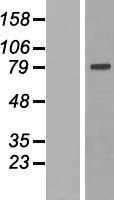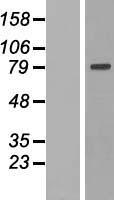order histories, retained contact details for faster checkout, review submissions, and special promotions.
Forgot password?
order histories, retained contact details for faster checkout, review submissions, and special promotions.
Location
Corporate Headquarters
Vector Laboratories, Inc.
6737 Mowry Ave
Newark, CA 94560
United States
Telephone Numbers
Customer Service: (800) 227-6666 / (650) 697-3600
Contact Us
Additional Contact Details
order histories, retained contact details for faster checkout, review submissions, and special promotions.
Forgot password?
order histories, retained contact details for faster checkout, review submissions, and special promotions.
MTIF2
mitochondrial translational initiation factor 2
During the initiation of protein biosynthesis, initiation factor-2 (IF-2) promotes the binding of the initiator tRNA to the small subunit of the ribosome in a GTP-dependent manner. Prokaryotic IF-2 is a single polypeptide, while eukaryotic cytoplasmic IF-2 (eIF-2) is a trimeric protein. Bovine liver mitochondria contain IF-2(mt), an 85-kD monomeric protein that is equivalent to prokaryotic IF-2. The predicted 727-amino acid human protein contains a 29-amino acid presequence. Human IF-2(mt) shares 32 to 38% amino acid sequence identity with yeast IF-2(mt) and several prokaryotic IF-2s, with the greatest degree of conservation in the G domains of the proteins. Two transcript variants encoding the same protein have been found for this gene.
| Gene Name: | mitochondrial translational initiation factor 2 |
| Synonyms: | MTIF2, IF-2(Mt), IF-2mt, IF2(mt) |
| Target Sequences: | NM_002453 NP_002444.2 P46199 |
Publications (2)





If you do not find the reagent or information you require, please contact Customer.Support@LSBio.com to inquire about additional products in development.









